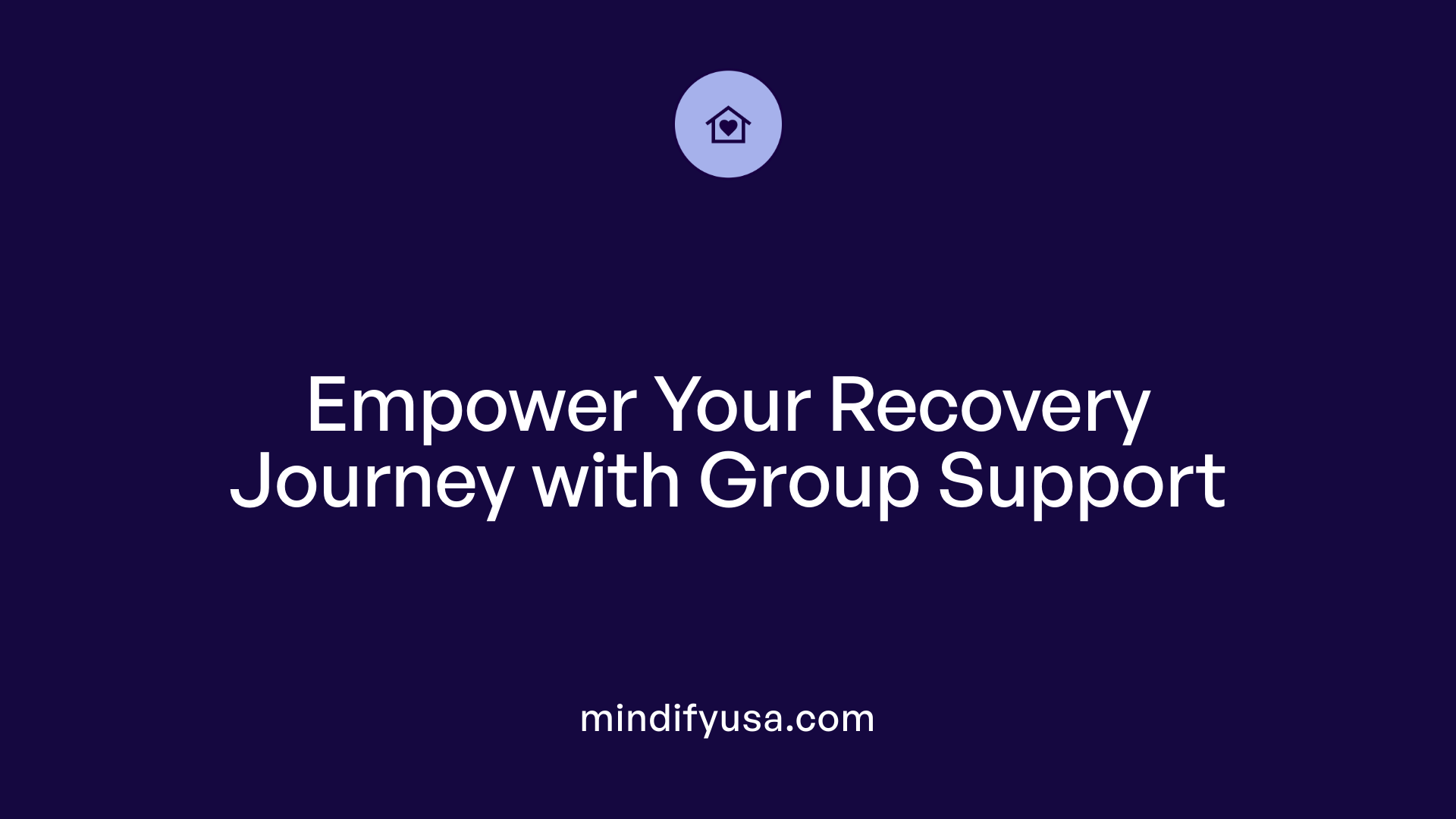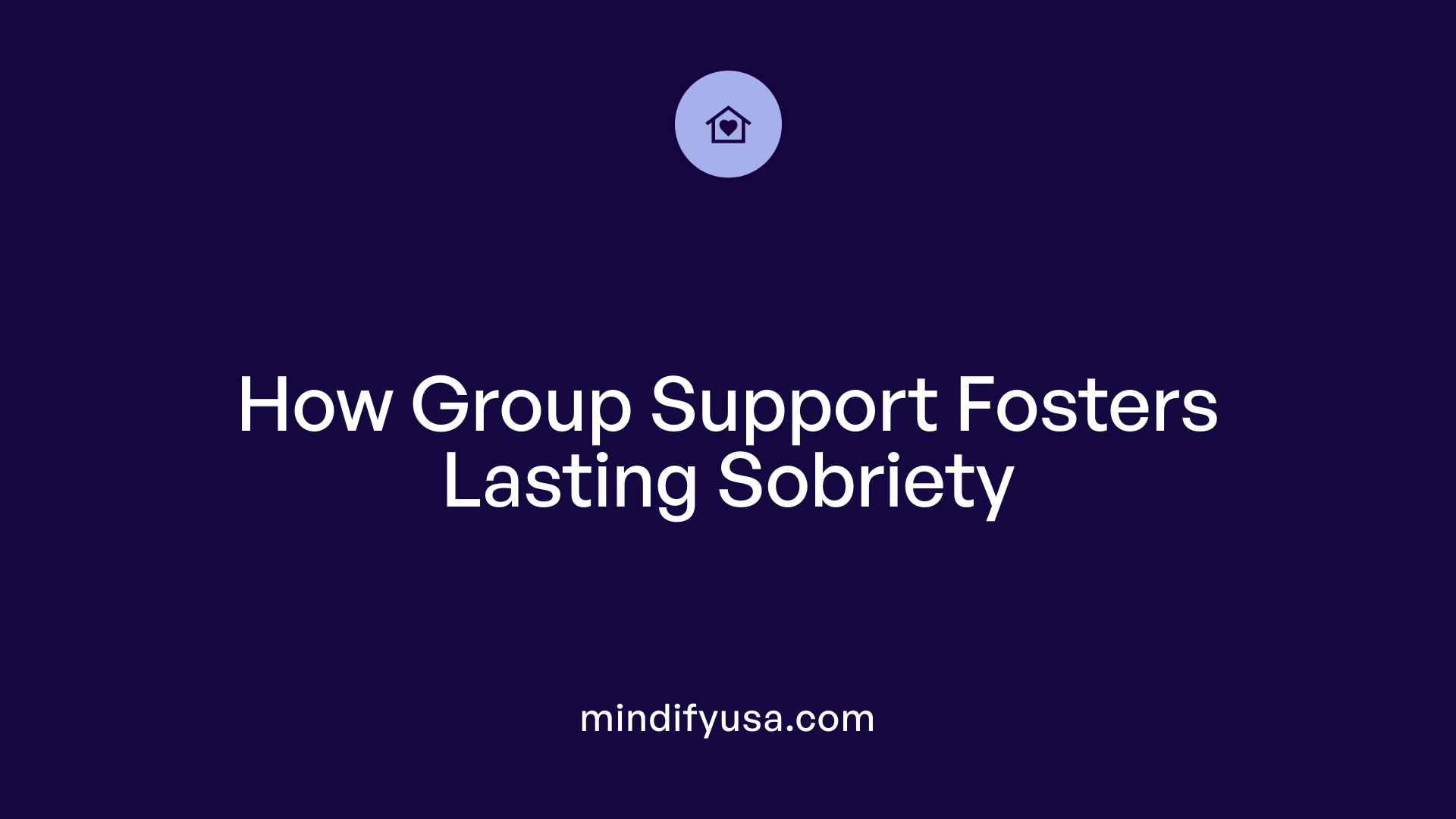An In-Depth Look at Group Therapy’s Role in Alcohol Treatment
Group therapy has become a cornerstone of effective treatment for alcohol dependence, leveraging collective support, shared experiences, and structured interventions to foster sustained sobriety. Rooted in evidence-based practices, it offers a diverse range of models tailored to meet individual needs, promoting social connection, motivation, and skill development essential for recovery. This article explores how group therapy functions within comprehensive treatment plans, examines its benefits, addresses challenges, and highlights the mechanisms that make it a vital component in overcoming alcohol use disorder (AUD).
Understanding How Group Therapy Supports Recovery

How does group therapy support alcohol dependence recovery?
Group therapy creates a safe space where individuals battling alcohol dependence can openly share their experiences and emotions without fear of judgment. This shared environment helps reduce feelings of isolation and shame, which are common in addiction.
Different models of group therapy, like cognitive-behavioral groups, relapse prevention sessions, and support groups such as Alcoholics Anonymous, focus on skill-building and emotional support. Cognitive-behavioral groups teach clients to recognize and challenge unhelpful thoughts and develop healthy coping strategies. Relapse prevention groups emphasize identifying high-risk situations and developing effective responses. Support groups encourage peer sharing and accountability, fostering motivation for sobriety.
Facilitation techniques are central to effective group therapy. Skilled facilitators, whether therapists or trained peers, use active engagement, role-playing, and open discussions to promote participation. They foster therapeutic factors like universality—the realization that others share similar struggles—and instill a sense of belonging.
Key elements such as group cohesion, trust, and mutual support enhance the therapy's impact. The focus on shared goals and collective accountability helps participants develop social skills and emotional resilience.
In summary, group therapy supports recovery through peer support, therapeutic engagement, structured interventions, and skill development, all of which contribute to sustained sobriety and emotional well-being.
| Model Types | Focus Area | Main Benefits | Typical Activities |
|---|---|---|---|
| Cognitive-Behavioral | Managing triggers and thoughts | Developing coping skills, modifying behaviors | Role-playing, thought restructuring, skills training |
| Relapse Prevention | Avoiding high-risk situations | Recognizing and responding to cravings, stressors | Psychoeducation, crisis planning |
| Support Groups | Peer encouragement | Building motivation, shared experiences | Sharing personal stories, group discussions |
| Interpersonal Process | Relationships and social skills | Improving communication, resolving conflicts | Interactive exercises, feedback sessions |
What are the benefits of different models of group therapy?
Each model caters to specific needs, whether it's understanding addiction, learning practical skills, or fostering emotional support. Combining these models adds depth to recovery programs.
How do facilitation techniques enhance therapy?
Facilitators create an inclusive environment, encouraging openness, providing feedback, and ensuring that each member feels heard and valued. Techniques like active listening, Socratic questioning, and encouraging self-disclosure deepen engagement and promote lasting change.
The Benefits of Group Therapy in Alcohol Dependence Treatment

What are the benefits of group therapy for individuals with alcohol dependence?
Group therapy plays a vital role in treating alcohol dependence by providing a supportive and communal environment where individuals can work through their recovery. One of its most significant advantages is the opportunity to build social support and a sense of community. Participants share their experiences and challenges, which helps reduce feelings of isolation and shame often associated with alcohol addiction.
In addition, group therapy fosters the development of coping skills and relapse prevention strategies. Through structured activities and peer discussions, individuals learn practical ways to manage cravings, handle high-risk situations, and implement behavioral changes. Practice in these areas enhances their confidence and readiness to face everyday triggers outside of therapy sessions.
Effective communication and empathy are also cultivated through group interactions. Participants engage in active listening, offer feedback, and develop a better understanding of others’ perspectives. These interactions improve interpersonal skills, strengthen emotional intelligence, and promote healthier relationships.
Moreover, involvement in group therapy boosts motivation and self-esteem. Witnessing others’ recovery progress inspires hope and reinforces their own commitment to sobriety. The mutual support and encouragement received from peers help individuals stay focused on their goals.
Research demonstrates that group therapy can be as effective as individual treatment, with added benefits like reduced costs and enhanced social skills. Overall, participation in group settings enhances emotional well-being, improves treatment engagement, and supports long-term recovery from alcohol dependence.
Types of Support Groups and Therapy Options Available
 Support options for alcohol use disorder encompass a broad range of groups and therapeutic approaches designed to meet diverse needs. Mutual aid organizations like Alcoholics Anonymous (AA), Al-Anon, and Alateen are among the most well-known peer-led, anonymous support groups. These programs operate on the 12-step model, providing a community where individuals and families can share experiences, seek guidance, and foster accountability in a compassionate environment.
Support options for alcohol use disorder encompass a broad range of groups and therapeutic approaches designed to meet diverse needs. Mutual aid organizations like Alcoholics Anonymous (AA), Al-Anon, and Alateen are among the most well-known peer-led, anonymous support groups. These programs operate on the 12-step model, providing a community where individuals and families can share experiences, seek guidance, and foster accountability in a compassionate environment.
Beyond mutual aid groups, health care settings often offer evidence-based therapies such as cognitive-behavioral therapy (CBT), psychoeducational groups, skills development groups, and interpersonal process groups. These structured sessions typically involve 5 to 10 participants and are facilitated by trained professionals, focusing on education about addiction, developing healthy coping strategies, relapse prevention techniques, and enhancing communication skills. Such group therapies can be delivered in outpatient clinics or inpatient facilities.
Online and community resources play a crucial role in expanding access to support. Many organizations, including SAMHSA, provide online treatment locators, virtual support groups, and text message services to help individuals find help near their location or through remote platforms. These resources allow for flexible participation and can be especially beneficial for those facing barriers to in-person treatment.
Integrating professional therapy with peer-led support offers the most comprehensive approach. While professional groups provide evidence-based interventions targeting psychological and behavioral facets of addiction, peer support fosters motivation, shared understanding, and emotional encouragement.
Overall, the combination of mutual aid organizations and formal therapy creates a robust network of support. It enables individuals to benefit from both expert guidance and the camaraderie of others who understand their journey, ultimately enhancing their chances of sustained recovery from alcohol use disorder.
What to Expect During Group Therapy Sessions for Alcohol Dependence

Confidentiality and Safe Environment
In group therapy for alcohol dependence, confidentiality is a foundational element. Participants are encouraged to share openly, knowing that what they discuss remains private within the group. This creates a safe space where individuals feel comfortable expressing their feelings, struggles, and personal stories without fear of judgment or disclosure. The structured environment fosters trust and allows members to explore sensitive topics related to their alcohol use and recovery progress.
Session Structure and Common Activities
Sessions typically involve small groups of about 5 to 10 participants and are facilitated by trained professionals such as counselors or peer leaders. Each session often lasts between 60 to 90 minutes, focusing on themes like coping strategies, relapse prevention, and communication skills. Common activities include group discussions, educational talks about addiction, skill-building exercises, journaling, role-playing, and sharing personal experiences. These activities are designed to enhance self-awareness, develop healthier social interactions, and reinforce behavioral change.
Range of Emotional and Cognitive Responses
Participants might have a broad spectrum of reactions during therapy. Some may experience feelings of relief, hope, and motivation, while others might face uncomfortable emotions like sadness, shame, or frustration. It is common to feel vulnerable when discussing personal issues, but these feelings are part of the healing process. Many individuals also gain insight into their behaviors and thought patterns, which helps in managing cravings and triggers. Over time, consistent participation can foster a sense of acceptance, empowerment, and community among members.
Role of Facilitators and Group Dynamics
Facilitators—often trained therapists or peer leaders—play a crucial role in guiding discussions and maintaining a positive, respectful atmosphere. They help manage group interactions, ensuring everyone has an opportunity to share and feel heard. Facilitators also address group dynamics, such as conflicts or dominance by certain members, and employ techniques rooted in evidence-based practices like cognitive-behavioral therapy (CBT) and motivational interviewing.
The success of group therapy relies heavily on dynamic interactions among members. Supportive peer relationships develop naturally, providing accountability and encouragement. The group’s collective wisdom and shared experiences act as a powerful motivator, instilling hope and resilience. As members observe others’ progress, they often feel inspired to continue their recovery journey.
In sum, when engaging in group therapy for alcohol dependence, clients can expect an environment that promotes safety, learning, emotional expression, and mutual support. These sessions serve as an essential component in a comprehensive approach to overcoming alcohol addiction, helping individuals rebuild their social skills, improve their mental health, and sustain long-term sobriety.
Integrating Group Therapy into Broader Treatment Plans
How does group therapy integrate into comprehensive addiction treatment plans?
Group therapy is a fundamental part of many addiction treatment strategies, providing a supportive environment where individuals can connect with others facing similar challenges. It offers peer support, social reinforcement, and a sense of community, which are crucial elements for recovery.
Different models of group therapy—such as psychoeducational, cognitive-behavioral, skills development, and support groups—are tailored to the specific needs of participants and the stage of their recovery journey. These models focus on various aspects, including addiction education, coping skills, relapse prevention, and interpersonal relationships.
When integrated with other treatment components like individual counseling and medication-assisted therapies, group therapy enhances overall effectiveness. For instance, while medications may address physiological aspects of addiction, group sessions work on psychological and social factors, fostering motivation, accountability, and community support.
Participation in group therapy can help individuals develop social skills, feel less isolated, and stay motivated to pursue sobriety. The shared experiences within the group encourage active engagement, self-reflection, and reinforcement of healthy behaviors.
Additionally, group therapy provides opportunities to practice relapse prevention strategies, learn from others’ experiences, and receive constructive feedback. This comprehensive approach addresses the complex psychological and social dimensions of addiction, making long-term recovery more attainable.
Overall, carefully structured group therapy, incorporated into a broader treatment framework, significantly supports sustained sobriety. It helps build a sense of belonging, promotes behavioral change, and lays a foundation for ongoing personal development and social reintegration.
Assessing the Effectiveness of Group Therapy in Alcohol Dependence
How effective is group therapy in treating alcohol dependence?
Research demonstrates that group therapy plays a significant role in treating alcohol dependence. It offers a supportive environment where individuals can share experiences, learn new coping skills, and find encouragement from peers facing similar challenges. Empirical studies and clinical trials have consistently shown that structured group modalities such as cognitive-behavioral therapy (CBT), mutual-help groups like Alcoholics Anonymous, and contingency management techniques can lead to reductions in alcohol consumption and improvements in psychological well-being.
When combined with medication-assisted treatments like naltrexone, group therapy can enhance outcomes by lowering the rates of relapse and promoting sustained abstinence. This combination approach addresses both behavioral and biological aspects of addiction, providing a comprehensive treatment strategy.
However, the success of group therapy depends on multiple factors, including the specific model used, the facilitator’s expertise, and the individual differences among participants. For instance, early recovery stages benefit more from peer support and social engagement found in group settings, whereas some individuals may require more tailored or intensive interventions.
Although existing evidence supports the effectiveness of group therapy, further high-quality research is necessary to determine how to best adapt and optimize these interventions. Customizing group formats to meet diverse needs, including cultural considerations and severity of dependence, remains an important focus for future studies.
In summary, group therapy is an effective and valuable component of alcohol dependence treatment. Its ability to foster connection, support sustained behavioral change, and reduce feelings of isolation makes it essential within comprehensive recovery plans.
Challenges and Future Directions in Group Therapy for Alcohol Dependence
What are some challenges faced in conducting group therapy for alcohol dependence?
Implementing group therapy for alcohol dependence involves navigating several obstacles that can affect treatment success.
One major challenge is managing group dynamics. Participants in these groups often have diverse backgrounds, varying levels of motivation, and differ in their stages of recovery. Facilitating an environment where everyone feels safe and engaged requires skillful navigation of social interactions and conflict resolution.
Another difficulty involves the training and experience of facilitators. Not all clinicians may have specialized training in group therapy or in addressing the specific complexities of addiction. Without adequate preparation, facilitators might struggle to adapt techniques that suit the unique needs of each group, ultimately impacting the overall effectiveness.
The common practice of using open-enrollment groups also presents challenges. With new members joining at different times, maintaining consistent content flow and fostering a cohesive group identity can be complicated. Facilitators have to adjust session plans dynamically, which can sometimes dilute the therapeutic process.
Moreover, reliance on didactic methods, such as straightforward educational lectures, has been found less effective. These approaches may not foster the interactive, skills-based engagement necessary for behavioral change. Transitioning towards more experiential and process-oriented techniques remains an ongoing goal.
To address these hurdles, ongoing development of evidence-based, adaptable group treatment models is essential. Equally important is improving clinician training and supervision that emphasize skills in managing diverse groups, fostering engagement, and implementing proven therapeutic approaches. This focus will help maximize the benefits of group therapy in supporting long-term recovery from alcohol dependence.
The Critical Role of Group Support in Sustained Sobriety
Overall, group therapy stands out as a highly effective, accessible, and versatile approach to treating alcohol dependence. Its capacity to foster social support, promote behavioral skills, and provide a sense of community makes it indispensable in comprehensive treatment programs. Despite challenges such as facilitator training and group dynamics, ongoing research and innovations continue to enhance its efficacy. As part of a holistic approach, group therapy not only supports the initial stages of recovery but also plays a vital role in maintaining long-term sobriety, offering hope, empowerment, and connection to individuals on their journey to wellness.
References
- National Helpline for Mental Health, Drug, Alcohol Issues - SAMHSA
- Group Therapy For Alcoholism
- 1 Groups and Substance Abuse Treatment - NCBI
- [PDF] Group Therapy In Substance Use Treatment - SAMHSA Library
- Alcohol use disorder - Diagnosis and treatment - Mayo Clinic
- Group Therapy vs Individual Therapy: Uses, Benefits & Effectiveness
- Group Therapy - Addiction Center
- Group therapy and support in addiction treatment. - APA PsycNET






































































































